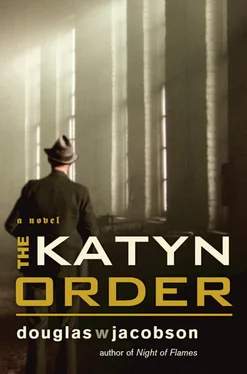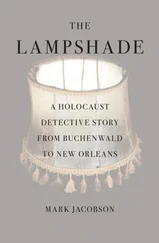She forced herself to calm down, trying to sort things out one more time. A moment passed, and gradually she realized what she had to do. “There’s someone I have to see. Go back the way we came and get on the tram. I’m going a different way.”
Adam balked. “But how will I find you?”
“I’ll find you .”
13 JUNE
A LONG, BLACK CITROËN drove from Krakow’s Central Station, through the Stare Miasto District and up the winding road of Wawel Hill. It circled around the castle, through the Dragon’s Den Gate and stopped next to the cathedral.
Dmitri Tarnov got out of the auto and stomped across the courtyard. He was oblivious to the three-story arcade of spiral columns, balconies and stone archways fronting the palace rooms that had served as knights’ quarters, armories and the royal treasury during Poland’s golden age. His mind was focused on only one thing as he flashed his identification to the NKVD officer standing guard, then pushed through a discreetly hidden doorway leading to the lower level. He made his way down a hallway, removed a key from his pocket and let himself into a small, windowless room.
Tarnov flicked on the light switch, closed the door behind him and re-locked it. Then he sat at the solitary table and stared at a row of filing cabinets containing the records of his interrogations and search of Hans Frank’s headquarters last January.
He realized that his sudden fixation on Ludwik Banach might be nothing more than a wild goose chase. But there was something about this law professor’s connection to Frank that compelled him to dig deeper. He was determined to hunt down Ludwik Banach and find out what he knew. And the search had to start here, in these files. It had to be here somewhere, the one thing Tarnov knew he must have overlooked…
After more than an hour of digging, Tarnov discovered a file he had set aside as irrelevant last January. It was labeled Staatsbibliothek Krakau. He rubbed his eyes, shifted in the hard wooden chair and opened the file. As he leafed through it, he discovered page after page of copious notes written by Hans Frank about Germanizing the Copernicus Memorial Library. Tarnov shook his head. No wonder he had tossed it to the side six months ago. Who the hell cared about a library?
As Tarnov kept reading, however, it became obvious that this was a special project for Frank, and he had visited the library often, discussing with the staff the transfer of thousands of books and documents into the new facility. It was indeed a mission, bordering on obsession—the establishment of a new Center of German Culture right here in Krakow, with Frank at the center of it all.
Eventually, digging deeper into the file, a smile came across Tarnov’s face as he discovered the name of a person who worked at the library, a person with whom Frank met frequently. Ludwik Banach.
Tarnov read further. There were more notes, written by Frank, about discussions he had with Banach on all manner of subjects—books, periodicals, works of art, the events of the war, the construction of Jewish ghettos—hinting at an importance Frank placed on Banach’s opinions. Tarnov propped his elbows on the table. What does it all mean? What else did Frank share with him?
Tarnov continued flipping through the file, searching for anything that might provide a clue to Banach’s whereabouts. There was nothing.
Then, at the very end, he discovered a list of people who worked at the library. With typical German thoroughness the list was complete with job descriptions, departments in which each individual worked and the dates of their employment. Tarnov studied the list, making notes, cross-referencing the information, until another name caught his attention, someone who worked closely with Ludwik Banach.
Tarnov sat back and took a deep, satisfied breath. He circled the name, folded the list and slipped it in his pocket. He was annoyed and frustrated that he had overlooked the file earlier, but he put it out of his mind. There was still time. Banach was out there somewhere. And now he had a place to start.
14 JUNE
NATALIA KNELT IN A PEW at the Church of Archangel Michael and Saint Stanislaus, waiting her turn for confession. She held a rosary in her hand, but she wasn’t praying. She’d stopped praying long ago, feeling betrayed by God as everything she’d known and everyone she’d loved had been crushed under the heels of fascists and communists. She wasn’t praying, but in her heart there was a feeling that hadn’t been there for a long time. There was a glimmer of light in the darkness.
Adam was alive.
Could there still be a chance? she wondered. After all the brutality, the killing and destruction… Could there still be a chance?
She hadn’t known what to say when she saw him yesterday, standing at the bottom of the cellar stairs. As she thought about it now, she realized at that moment she had been consumed with fear. After all she’d been through, the idea that another person could mean as much to her as Adam did had terrified her.
And she didn’t know what to say.
Finally it was her turn, and Natalia made the sign of the cross and stepped over to the confessional. Today was Thursday, and it had been well established for years that contact was only to be made on Wednesdays. But surely the priest would recognize her voice. She cleared her throat and said, “In the name of our Lord I come seeking.”
There was silence. Finally the voice from behind the screen whispered, “What have you done with the gift you received from our Lord and Provider?”
Natalia’s eyes darted around the semi-darkness of the sanctuary. “It is safe, Father.”
“Do you seek consultation?”
“Yes.”
Another moment of silence, then the priest said, “Tonight, eight o’clock, on the Rynek Glowny, the southwest corner of the Cloth Hall.”
The colossal Renaissance edifice of the Cloth Hall, adorned with Italian gargoyles glaring down from an ornately sculpted roof, dominated the center of the Rynek Glowny. Dozens of arcades and merchant stalls lined both sides of the ground floor where traditionally all manner of goods could be purchased, from dishware to clothing, candy, cigars, amber jewelry and artwork. Though few of the stalls had anything of value to sell in the aftermath of the war, and few of the people milling about had money to spend, it was still one of the busiest locations in Krakow on this warm Thursday evening.
Natalia took up a spot on the southwest corner providing a good vantage point from which to observe the comings and goings of the teeming square. She was still nervous about being out in public in a big city surrounded by thousands of unfamiliar faces. Ever since her escape from Warsaw, and especially since she’d been forced to shoot the two NKVD agents near the Bolimowski Forest, Natalia expected at any moment to feel a heavy hand grip her shoulder.
The priest arrived a few minutes past eight. Tonight he was dressed in a gray suit and fedora, indistinguishable from the hundreds of other men milling about the area.
“We should take a walk,” he said in his usual clipped manner.
Natalia nodded, and they walked slowly around the perimeter of the vast building.
“I know that Ludwik Banach is the Provider,” she said after a moment.
The priest stopped as abruptly as if he’d walked into a wall. His face was sheet-white. “Where did you…?”
“It was in the journal—the ‘gift’ you left for me. Didn’t you read it?”
“Of course not. I’ve never read any of the information received from the Provider. I just pass it along.”
Natalia doubted that was true.
“And, as I told you,” the priest continued, “the Provider is no longer among us.”
Читать дальше












